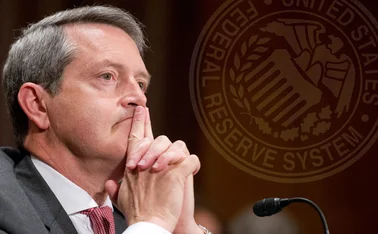
Central banking against a full-scale war
NBU governor Andriy Pyshnyy shares seven statements about ‘antifragility’ and ability to function under uncertainty – and succeed
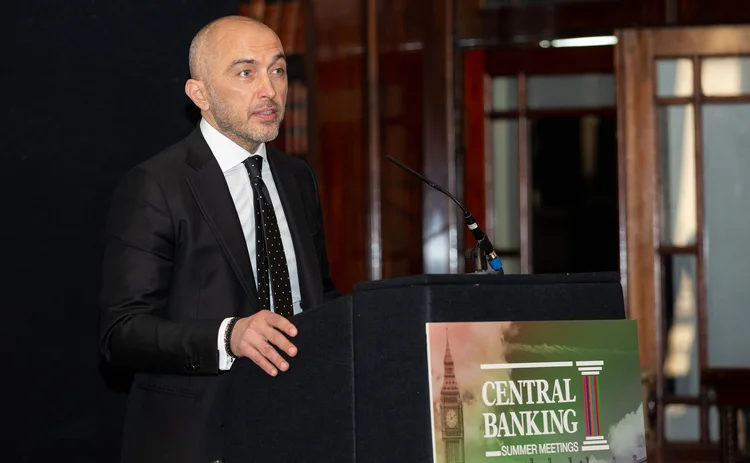
This is a translated transcript of a speech made by National Bank of Ukraine governor Andriy Pyshnyy on June 14 at the Central Banking Summer Meetings 2023 in London.
I want to start my speech before this reputable audience with words of gratitude.
Firstly, I have this opportunity to thank you sincerely for the support and assistance our country, in general, and the National Bank of Ukraine, in particular, receive from you and the entire global community, including from the countries you represent.
Secondly, I thank you for the high praise given to the team of the National Bank of Ukraine at the Central Banking Awards, which conferred three awards on the central bank, including the most important one: Central bank of the year. I want to thank each NBU employee, all Ukrainian banks and their teams.
This result could only be achieved through the synergy of all Ukrainian teams: the president of Ukraine, the National Bank, the government and our partners. This award belongs to millions of my compatriots, and obliges us to be even stronger since the war is still going on.
The war. This is more than a terrible word. It is a reality that is even more terrible. This is an existential challenge for the Ukrainian people. It was obvious to us from the first days of the war, and it became obvious to the world after the Bucha and Izium tragedies. This is also an existential challenge for the European region, as we can see from the environmental disaster caused by the Kakhovka dam destruction by the Russians. Therefore, we Ukrainians have no other choice than to resist and win.
Ukraine turned out to be the cornerstone on which the transition to the new global order is based, first and foremost through a transition to the new security and economic order
At the same time, the war has mobilised our internal efforts and wide-scale support from our partners, including in the financial sphere. Support and partnership did not only help us survive – it became one of the key elements of our superpower, which we, the NBU, call ‘the resilience factor’.
I am grateful for yesterday’s speech by Mr Das (Governor of the Reserve Bank of India), who made very good use of the reference to ‘black swans’, which I will elaborate on in my speech. After all, our resilience factor has a synonym, well-known in the western world, which was proposed more than 10 years ago by Nassim Taleb, and it is ‘antifragility’ – the ability to function under uncertainty, and to succeed.
This Ukrainian antifragility and resilience has absolutely been a real economic factor during the war, and we even take it into account while determining policy. And international support, in particular, from our colleagues from other central banks, is a multiplier of this resilience.
Why is our experience important?
There are at least three reasons:
- Firstly, we found ourselves on the front line of a conflict caused by the revisionist attempts of an autocracy, and from the past. The modern world hoped for a gradual evolution. Ukrainians hoped for the same. However, we were deprived of such an opportunity. Unfortunately, we have to move forward at an overly high cost. Ukraine turned out to be the cornerstone on which the transition to the new global order is based, first and foremost through a transition to the new security and economic order.
- Secondly, Ukraine is the foremost warrior on the line of contact between the future and the past. Let’s be honest: even in the times of the Cold War, there was no such extreme uncertainty, such as those of today. There was no such deep vulnerability of the global economy to the shocks generated by war challenges. The oil crisis of the 1970s seems a routine affair compared to what is happening now, for example, with food or modern electronic-chip production.
- Thirdly, Ukraine resisted and continues to resist, even with extremely limited resources. No guidebooks teach how to act during the full-scale war in the centre of Europe in the 21st century. We highly appreciate all of the support and assistance our partners have given us. However, our enemy still has powerful resources. Shall we be scared? As you can judge from the 476 days of our resistance and the counteroffensive – no, we are not scared. But the situation requires a fast, unorthodox and asymmetrical response, and co-operation. The sanctions pressure on the aggressor is one of the strong examples.
The full-range of threats that Russia has generated by its full-scale and brutal invasion of Ukraine has created a perfect storm. Forced migration, the destruction of supply chains, human-caused and environmental disasters, attempts to test the immunity of the democratic world to resistance, and challenges for the global security system.
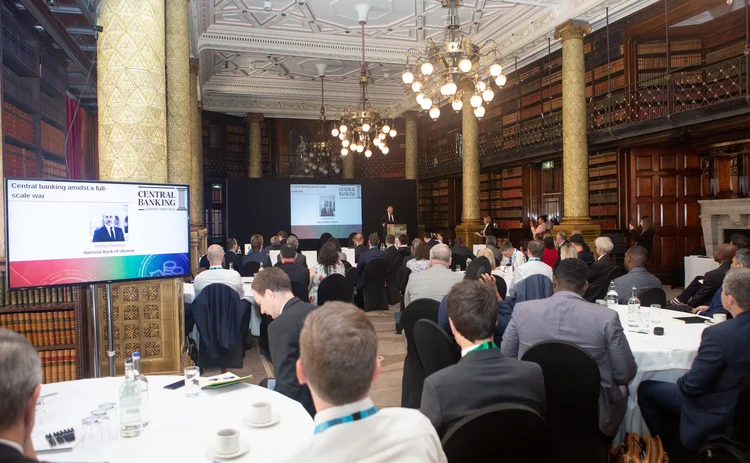
The combination of these factors and phenomena has become a black swan that was not really expected.
It was as if a time vortex had appeared, and horrible things similar to those that happened in Europe during World War II, but supplemented with apocalyptic future images, flooded through it into the modern humanist world. The modern central bank of this country, with a financial system that has high technology and a high digitalisation level, is facing these horrible things.
We have to respond to the challenges. The world should respond with joint efforts: in a powerful, creative and asymmetrical manner. We are not only acting under the conditions of a lasting war, we’re also analysing threats, conditions and opportunities. So let me propose a few statements for your consideration.
Statement 1: If it is impossible to anticipate what future black swans may be like, then we all have to become antifragile
Over the past few years, the world has faced black swans – unexpected events and effects – rather regularly: Covid; Russia’s war against Ukraine. What’s next? Maybe a future combat between the democratic world and authoritarian regimes, as I have already mentioned. Or a climate challenge, although we know about this swan in advance, so it is not that black, although the challenge is global and extremely dangerous.
We Ukrainians have no other choice than to resist and win
Let me come back to Nassim Taleb’s book Antifragile: things that gain from disorder. This is a quote: “By grasping the mechanisms of antifragility, we can build a systematic and broad guide to non-predictive decision making under uncertainty …”
Some may find Taleb’s ideas too outlandish, but they are worthy of attention, as he personally witnessed the influence of war on life in Lebanon, where he was born and developed his personality. Moreover, I’m sure that everyone in this room is looking for decisions that would help ‘them be prepared for unpredictable events and the influences of exogenous factors’ – influences that grow year on year.
The influence of exogenous factors is growing because the world is becoming more and more interdependent. And even rather expected or projected events if combined in a certain way in time and space are able to generate another black swan. Examples of such interdependency? Let’s take the food crisis in Africa, where already known problems (climate, intergovernmental relations, strong global increase in food prices) were aggravated by Russia’s aggression against Ukraine. And it turned out that Ukraine plays a key role in global food security, which caught some people by surprise.
Statement 2: The special role of central bank leaders
We already see that the financial system is a key battlefield in times of global challenges. The consequences of the destruction of the financial system are similar to those of the destruction of blood circulation in a human being. The most important thing while facing global challenges is to avoid scarring of the financial system, in particular, and the global economy in general. The freshest example of such scarring is the ‘inflation tail’ after Covid-19.
Ms Kristalina Georgieva, the managing director of the International Monetary Fund, was probably the first to speak about the strong long-term impact of the financial crisis on the condition of society and the economy in general in early April 2020, at the peak of the pandemic: “We are determined to use [financial resources] as much as … necessary protecting the economy against the scarring of this crisis … Protect your economy, the most vulnerable people and firms, so they can hold onto their workers. Because the highest risk we see is a wave of bankruptcies and lay-offs that would make the recovery from this crisis harder.”

Therefore, we now see that one of our key tasks is to minimise the scarring of the Ukrainian economy. We saw the example of Covid, and drew conclusions from the powerful and non-standard steps taken by international financial institutions and the most experienced central banks during the recovery from the pandemic crisis.
Since the start of the war, we have directed our efforts to securing the continuous functioning of the banking system and payments in the economy.
At the first stage, we had to support the state budget and to limit its monetisation at the same time, which helped us maintain macro-financial stability. We managed to preserve confidence in the local currency, control over the price increase rate, and the relative stability of the FX market. The domestic debt market began to operate.
It was when the war shock caused the loss of one-third of GDP.
Thanks to administrative measures, limited restrictions, a prudent intervention policy and international assistance, we managed to retain international reserves, and to slow the growth of consumer prices nearly twofold compared to the peak indicator, to 15% per annum as of June 1. Today, our international reserves are at their highest level in the last 11 years.
All of these factors have enabled us to start preparing to return to market mechanisms. At the same time, it helped maintain the stability of the banking system and even cautiously resume lending.
Statement 3: The extraordinary nature of our experience
With no guidebooks for the case of a full-scale invasion, the National Bank of Ukraine became a generator and a tester of new unconventional solutions. We worked under conditions with the tightest resources, proposed and discussed with our foreign partners the solutions that resulted in changes in the policies and approaches of leading international financial institutions. Ukraine has paid a very high price for an extremely valuable experience.
The new IMF programme can be such an example. It is part of the general package of external financial support to Ukraine, which amounts to $115 billion – this is according to the baseline scenario. In the case of more aggressive and longer hostilities, the amount of necessary support increases to $140 billion. Considering the conditionality of the new IMF programme, the financing it provides, and the qualitative changes in our co-operation with the IMF, it is unprecedented. After all, so far, the IMF’s mandate has not covered war-related cases due to the complexity of assessing risks to security.
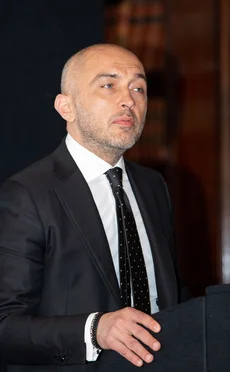
From now on, credit facilities can be approved in situations of “exceptionally high uncertainty, involving exogenous shocks that are beyond the control of country authorities and the reach of their economic policies”. That means that in the future, other countries suffering from military aggression or some other long-term external shocks, can count on help.
This means that the world, which became even more vulnerable after the Russian invasion of Ukrainian territories, will become more protected. And so, by proving its ability to counter extreme challenges and properly fulfil obligations even in wartime, Ukraine made a kind of gift to the whole world.
An open economy, a rather deep orientation to exports, the recent shock of the pandemic consequences, a rather modest GDP-per-capita level, plus the occupation of nearly one-third of the country’s territory by the aggressor, and strikes on energy and transport infrastructure, were a terrible combination. But we coped with it, we preserved financial and price stability. We have something to share.
Statement 4: The flexibility and adaptiveness of the central bank as an institution
Of course, we should have had several Plan B options in reserve. But they are critically limited, since the swan was black. The real shock turned out to be much more powerful. Therefore, the central bank, as an institution, has to become ‘super-adaptive’ and much more innovative than could have been expected.
From our experience, the central bank also has to be more innovative and proactive than any potential source of uncertainty. We have gained some experience since 2014, when Russia occupied Crimea and a part of Donetsk and Luhansk oblasts. We prepared ourselves, but it became crucial to be quick and to be ready to act right after the first missiles fell on our capital city, just a few kilometres away from the NBU’s headquarters.
Statement 5: People are the basis of antifragility
I maintain that the fires next door have to be put out before they reach your home
After all, this antifragility is implemented by a specific team and by specific people. These people have to keep the system going – even when they literally lose the ground under their feet, and when the missiles fall from the sky. The strategy is worth nothing if there is nobody to implement it. And vice versa: each motivated and professional team member is a carrier of antifragility, our resilience factor.
When, from the early autumn of 2022, Russia started making attempts to destroy the Ukrainian energy system, we created a single and unique common banking network – Power Banking, a system that can ensure the uninterrupted functioning of the financial system under regular power cuts and a full blackout. Can you imagine that competitor banks supported each other? This is how it worked in Ukraine. The entire financial sector worked as a single team during that crisis period. It is not only about professionalism, the level of qualification and technological excellence. It is about ethics, commitment and patriotism.
Statement 6: We should keep the strategic focus and reduce the area of uncertainty for society and business
Our experience tells us that the central bank should develop an antifragility strategy capable of shrinking areas of uncertainty as quickly as possible, developing the capability to resolve local problems by financial-sector players on their own, proactively engaging stakeholders in the joint resolution of arising problems, and precisely balancing priorities.
All of these principles formed the basis of a new strategy by the NBU, which was adopted a few weeks ago. Its name is ‘Financial Stronghold’.
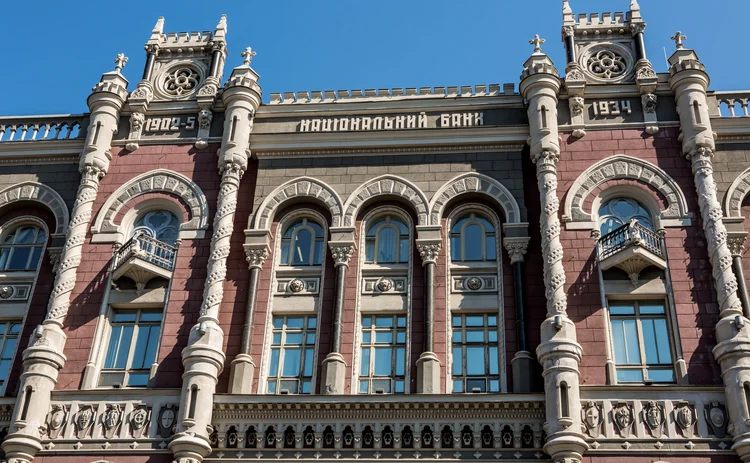
The threats and challenges of both wartime and post-war reconstruction required that the NBU update its strategic development objectives and enhance the flexibility of its planning methodology. This is despite the fact that we have not had – and still do not have – the answer to the key question: when will the war end?
Is strategic planning feasible before the end of combat actions? Shall we consider strategic planning as a tool for the reduction of uncertainty? Our answer was “yes”. This is probably why the National Bank of Ukraine is the first – and, so far, the only – state institution in Ukraine to have publicly presented a new strategy during the war. As a result, we obtained a straightforward and specific document that had two main focuses. The first focus is the period of resistance and adaptation to European standards. The second focus is post-war recovery. We had to consider the challenges of the time, new conditions, and the need to reduce uncertainty areas.
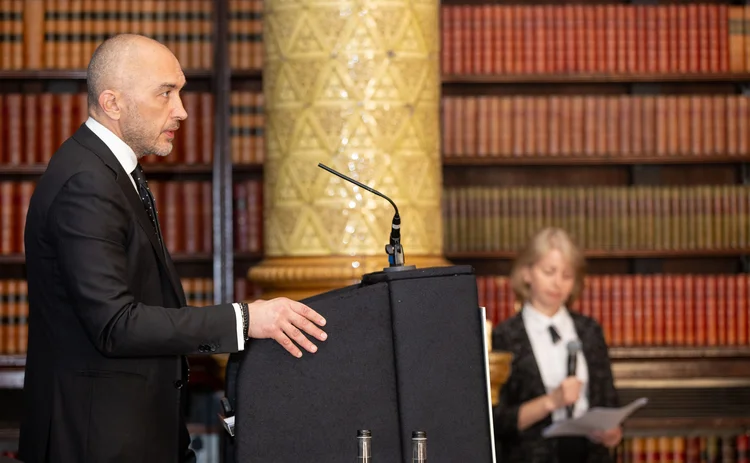
Statement 7: The roles of central banks as a source of stability and leadership
In this respect, prompt communication with colleagues and central banks is crucial: information exchange and mutual support.
The leadership of central banks also means powerful use of available mandates and international legal tools. Examples? The FAFT [Financial Action Task Force] plenary meeting is coming soon, and we are waiting for its outcomes, which will define future anti-money laundering and anti-terrorism-financing measures. First and foremost, blacklisting a country that undermines not only the financial system but also the global security architecture: Russia must be on the blacklist. Ukraine has prepared the respective statement, clear legal arguments, and firm evidence of Russia’s role in financing terrorism. We hope that your delegations to FATF will support the blacklisting of Russia to secure the international financial system against Russia’s criminal actions.
I maintain that the fires next door have to be put out before they reach your home. I believe this is the proper joint response, and a strong foundation for global financial antifragility.
Brief conclusions
Conclusion 1: Our responsibilities have expanded to the horizon
Leaders of central banks make decisions that are triggers for the whole world. Thus, our responsibilities are huge. We have responsibility vis-à-vis society. The leadership of central banks has gone far beyond the financial sector – this is a matter of fact.
Conclusion 2: Antifragility should become an element of our DNA
Financial systems must become antifragile. Therefore, we must generate a new quality of strategies. This should be our firmware.
Conclusion 3: Our contribution to the global security system
Here I want to thank our defenders, Ukraine’s armed forces. Now, in Ukraine, we pray to absolutely real gods who have faces and names. I am proud to know some of them personally. They are holding up our sky. The sky from which more than 560 missiles and kamikaze drones rained down in May alone. Thanks to the courage of these men and women, I am able to be speak here. Thanks to them, my family is alive, as are millions of Ukrainian citizens.
Right now, gaining freedom through severe battles, we are using our experience and work results to repay the debt we owe to those who support us now and who will support us after victory.
To end my speech, I thank you again, and I thank all of the people who support Ukraine’s fight for the values of humanism, freedom and democracy. In her speech at the Nobel Peace Prize ceremony in December 2022, the Ukrainian Oleksandra Matviichuk said: “I will allow myself to reach out to people around the world and call for solidarity. You don’t have to be Ukrainians to support Ukraine. It is enough just to be humans.”
This might seem dramatic for a central bank governor’s official speech. But I will conclude with more of her words: “It’s time to assume responsibility. We don’t know how much time we have left.”
Thank you for your attention!
Glory to Ukraine!
Only users who have a paid subscription or are part of a corporate subscription are able to print or copy content.
To access these options, along with all other subscription benefits, please contact info@centralbanking.com or view our subscription options here: www.centralbanking.com/subscriptions
You are currently unable to print this content. Please contact info@centralbanking.com to find out more.
You are currently unable to copy this content. Please contact info@centralbanking.com to find out more.
Copyright Infopro Digital Limited. All rights reserved.
As outlined in our terms and conditions, https://www.infopro-digital.com/terms-and-conditions/subscriptions/ (point 2.4), printing is limited to a single copy.
If you would like to purchase additional rights please email info@centralbanking.com
Copyright Infopro Digital Limited. All rights reserved.
You may share this content using our article tools. As outlined in our terms and conditions, https://www.infopro-digital.com/terms-and-conditions/subscriptions/ (clause 2.4), an Authorised User may only make one copy of the materials for their own personal use. You must also comply with the restrictions in clause 2.5.
If you would like to purchase additional rights please email info@centralbanking.com




